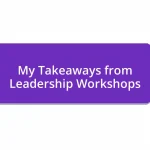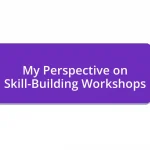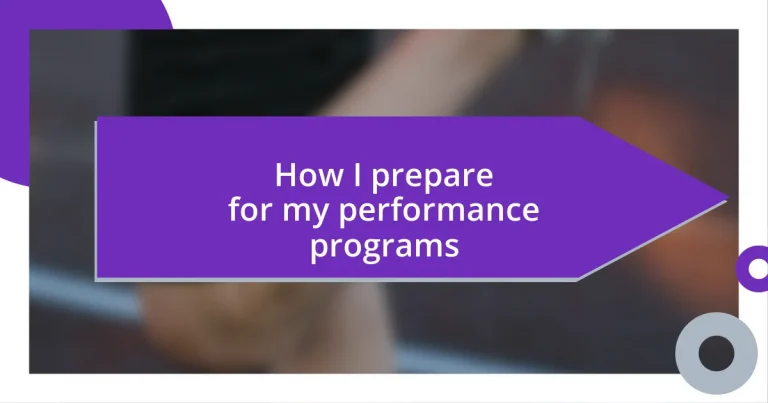Key takeaways:
- Clearly defined performance goals provide direction and build confidence through achievable milestones.
- A structured practice routine, including warm-ups and reflection, enhances focus and emotional engagement in performances.
- Mental preparation strategies like visualization and positive affirmations help manage performance anxiety and boost confidence.
- Nutrition, hydration, and rest are essential for maintaining energy and optimal performance levels.
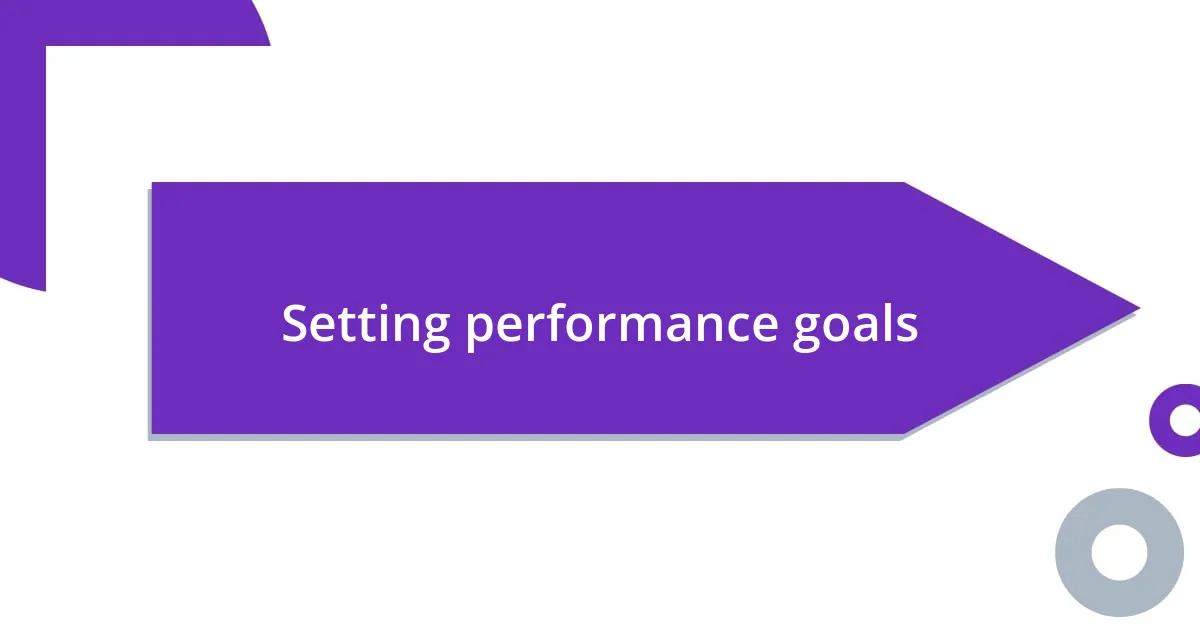
Setting performance goals
Setting performance goals is crucial to my preparation process. I remember a time when I set what I thought were ambitious yet vague goals for a show. Instead of soaring to new heights, I found myself feeling lost and frustrated. I learned that clearly defined goals provide a roadmap, giving me a sense of direction and purpose during rehearsals.
When I establish my performance goals, I try to balance challenge with attainability. It’s essential to push myself, but I also have to be realistic—after all, how many times have I felt deflated after missing an overly ambitious target? For me, breaking down goals into smaller, achievable milestones has increased my confidence, allowing me to celebrate each success along the way.
Emotional connection plays a huge role in goal-setting as well. I often ask myself: why do I want to achieve this? The more deeply personal the goal, the more motivated I feel. For instance, after thinking about the message I wanted to convey in my last performance, I realized that my goal was not just to impress the audience, but to resonate with them emotionally. That realization transformed my approach and truly enhanced my delivery.
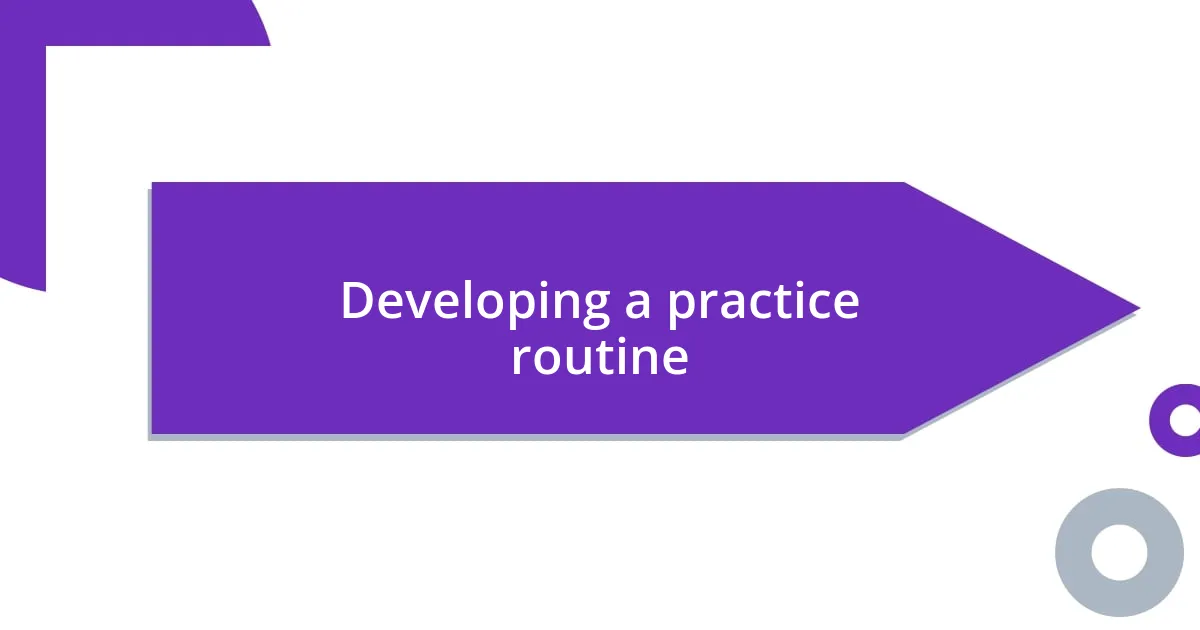
Developing a practice routine
Creating an effective practice routine is essential for my performance preparation. I find that structuring my time helps me stay focused and make the most of each practice session. For example, I often dedicate the first part of my routine to warm-ups, gradually transitioning into more challenging material. There’s a rhythm to it—one that I’ve refined over the years. I came to appreciate that a well-considered routine minimizes the mental burden of deciding what to work on each day, allowing me to concentrate on my growth.
Here’s how I break down my practice routine:
- Warm-up (10-15 minutes): Focus on vocal exercises or physical stretches to get into the right mindset.
- Technique (20-30 minutes): Dedicate time to specific skill-building exercises, such as scales or stretches, where I can really focus on my weaknesses.
- Repertoire (30-45 minutes): Work on the pieces I’ll be performing, breaking them down section by section to ensure mastery.
- Reflection (5-10 minutes): Take a few moments to jot down my thoughts after each session, noting what felt good and what needs more attention.
In each practice, I integrate moments of reflection—it allows me to connect emotionally with my material. Sometimes, I find myself lost in a passage, feeling the story behind the notes, which fuels my desire to improve. This blend of structure and emotional engagement not only enhances my learning but also deepens my connection to the performance itself.
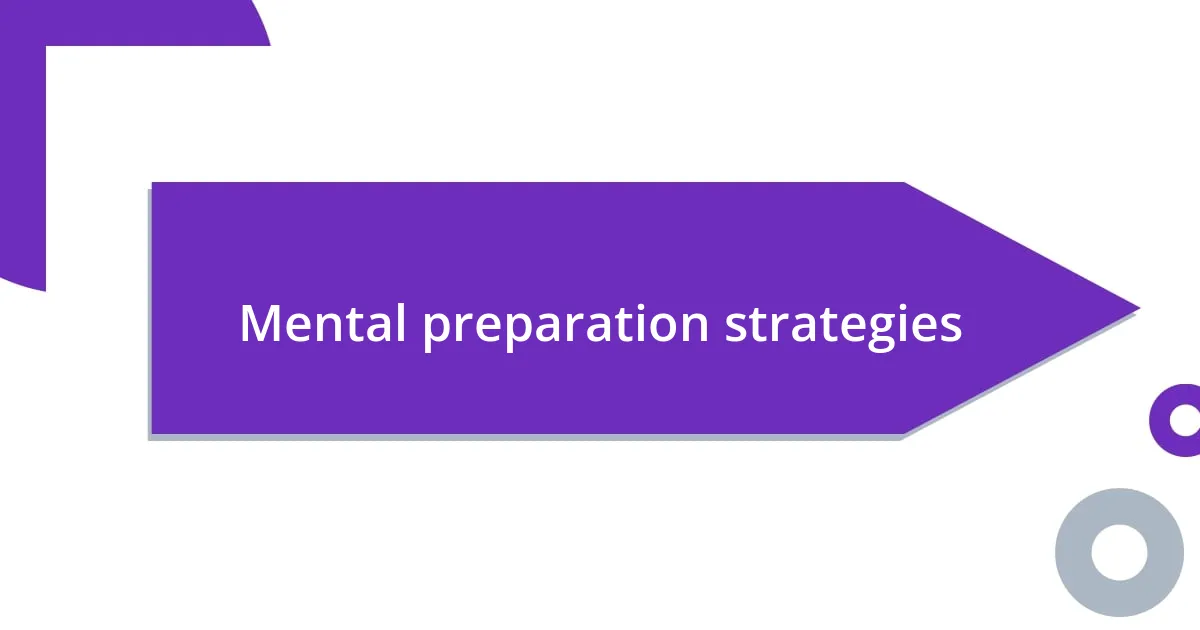
Mental preparation strategies
When it comes to mental preparation strategies, visualization has been a game changer for me. Before stepping on stage, I often close my eyes and vividly imagine every detail of my performance—the lights, the audience, even the emotions I want to express. This mental rehearsal not only calms my nerves but also solidifies my confidence. I find that experiencing my performance in my mind allows me to encounter and overcome obstacles before they even happen, preparing me to perform more effectively in reality.
Another strategy I employ is positive affirmations. I remember a particularly nerve-wracking performance where self-doubt crept in. I started to repeat phrases like “I am capable” and “I bring joy to my audience” to myself before heading on stage. This technique shifted my mindset, replacing anxiety with assurance and enthusiasm. By reinforcing a positive self-image, I create a mental barrier against negativity, allowing me to focus entirely on my performance rather than my fears.
I also practice mindfulness and breathing exercises. Oftentimes, right before I perform, I take a few deep breaths to center myself. It might sound simple, but it’s incredibly impactful; by focusing on my breath, I create a moment of calm amid the chaos. This instant of grounding helps me clear my mind, allowing creativity and spontaneity to flow freely in my performance. I can fully immerse myself in the experience without the weight of external pressures weighing me down.
| Mental Preparation Strategy | Description |
|---|---|
| Visualization | Picturing the entire performance in my mind, from beginning to end, enhances my confidence and prepares me for challenges. |
| Positive Affirmations | Repeating encouraging phrases boosts my self-esteem and wards off anxiety, helping me focus on delivering my best. |
| Mindfulness and Breathing | Practicing deep breathing techniques centers my mind and prepares me to engage creatively with my audience. |
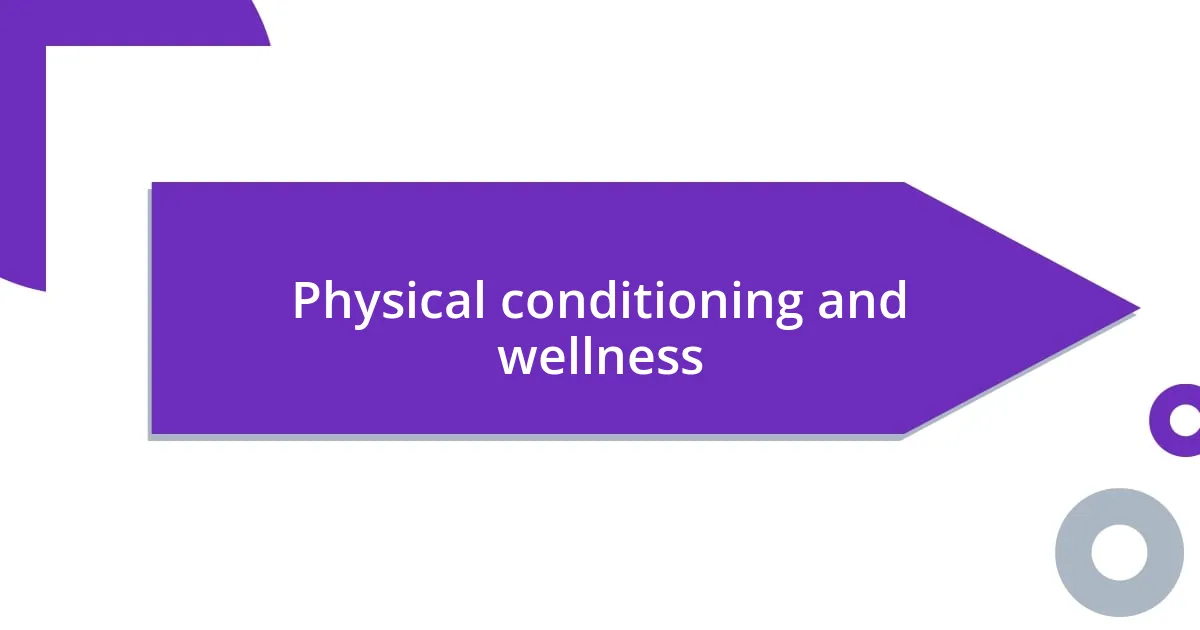
Physical conditioning and wellness
When I think about physical conditioning and wellness, I realize how intertwined they are with my performance. There’s nothing quite like the buzz of energy I feel after a good workout session. My routine often includes strength training and cardio to boost my stamina. I’ve found that feeling fit helps relieve performance anxiety. Have you ever noticed how a little movement can uplift your mood? I often mix in yoga, which not only helps with flexibility but also keeps my mind clear and focused.
Nutrition plays a crucial role as well. I make it a point to eat balanced meals, prioritizing whole foods like fruits, vegetables, lean proteins, and whole grains. It’s fascinating—a few weeks ago, after indulging in too many processed snacks, I felt sluggish and unfocused during rehearsals. It was a clear reminder that what I put into my body directly impacts my performance. I love to experiment with healthy recipes that keep me energized, helping me feel sharp and ready to take on the stage.
Rest and recovery can’t be overlooked either. I’ve learned the hard way that burning the candle at both ends leads to burnout. I now prioritize sleep and make time for rest days, recognizing their importance in maintaining my overall well-being. Last month, after a particularly exhausting rehearsal schedule, I took a weekend off to recharge. Returning, I was amazed at how refreshed and vibrant I felt. This balance helps me maintain not just physical health, but also a positive mental outlook essential for giving great performances. It’s all about finding harmony in the demands of training and self-care.
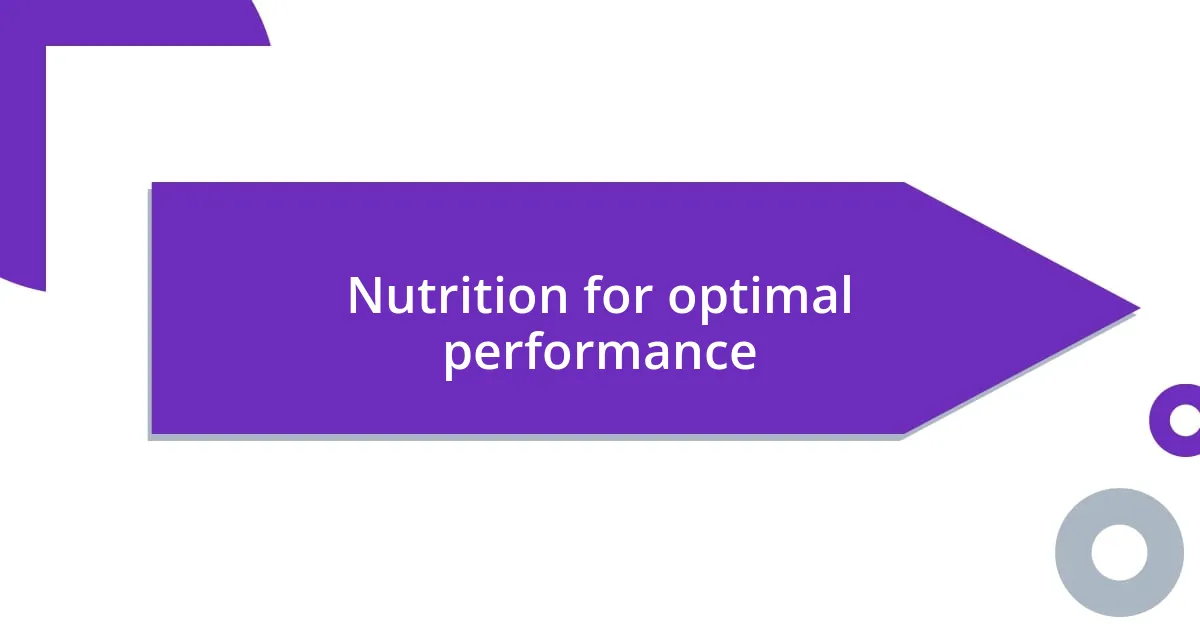
Nutrition for optimal performance
Nutrition is a foundational pillar of optimal performance for me. I remember a time when I was preparing for a particularly demanding show and opted for quick meals, thinking they would save me time. I felt sluggish and off my game during rehearsals. It hit me hard—my energy levels and mental clarity were directly impacted by what I consumed. Now, I consciously choose nutrient-rich foods that fuel my body and mind, like quinoa bowls loaded with colorful veggies and grilled chicken. Have you ever noticed how vibrant foods can make you feel?
Hydration is another essential aspect I can’t overlook. I’ve had moments where I rushed my pre-show routine and forgot to drink enough water. The result? I felt drained and unable to connect with the audience as I usually would. I’ve learned the hard way that even mild dehydration can affect performance. So now, I keep a water bottle with me throughout the day, always reminding myself to stay hydrated, especially before I step on stage. When I feel well-hydrated, everything—my focus, energy, and confidence—comes together beautifully.
Lastly, I embrace the power of timing when it comes to meals. Before a performance, I try to eat a balanced meal a couple of hours in advance. There’s a sweet spot for me, where I feel energized but not overly full. I recall a night when I underestimated this and ate a heavy meal too close to showtime. Let’s just say that my stomach had other ideas, and I spent half the performance trying to shake off that discomfort. Now, I experiment with lighter snacks like a banana or a handful of nuts as I gear up to perform. It’s these small tweaks to my nutrition that make a world of difference in my overall performance. What about you? Have you explored how what you eat affects your own performance?

Managing performance anxiety
Managing performance anxiety has become an essential part of my preparation process. I vividly recall a time when my heart raced before a big show, and I struggled to catch my breath backstage. In that moment, I learned that acknowledging my anxiety was the first step toward managing it. By simply accepting that nerves are a natural response, I found a way to shift my mindset to focus on the excitement of performing instead.
Breathing techniques have been game-changers for me. Before I go on stage, I take a few deep breaths, inhaling slowly through my nose and exhaling out of my mouth. It sounds simple, but in those few moments, I feel my body relax, and my mind clears. Have you ever noticed the difference deep breathing can make in stressful situations? It’s almost like hitting a reset button, allowing me to step into the spotlight with newfound confidence.
Visualizing my performance has also played a significant role in reducing anxiety. I picture myself on stage, moving through my routine with ease and connecting with the audience. This practice not only calms my nerves but also helps affirm my capabilities. There was a time when visualization turned my apprehension into anticipation, making me eager to showcase my hard work. Isn’t it amazing how our minds can influence our experiences? By embracing these tools, I feel more grounded, ready to share my passion with the world.
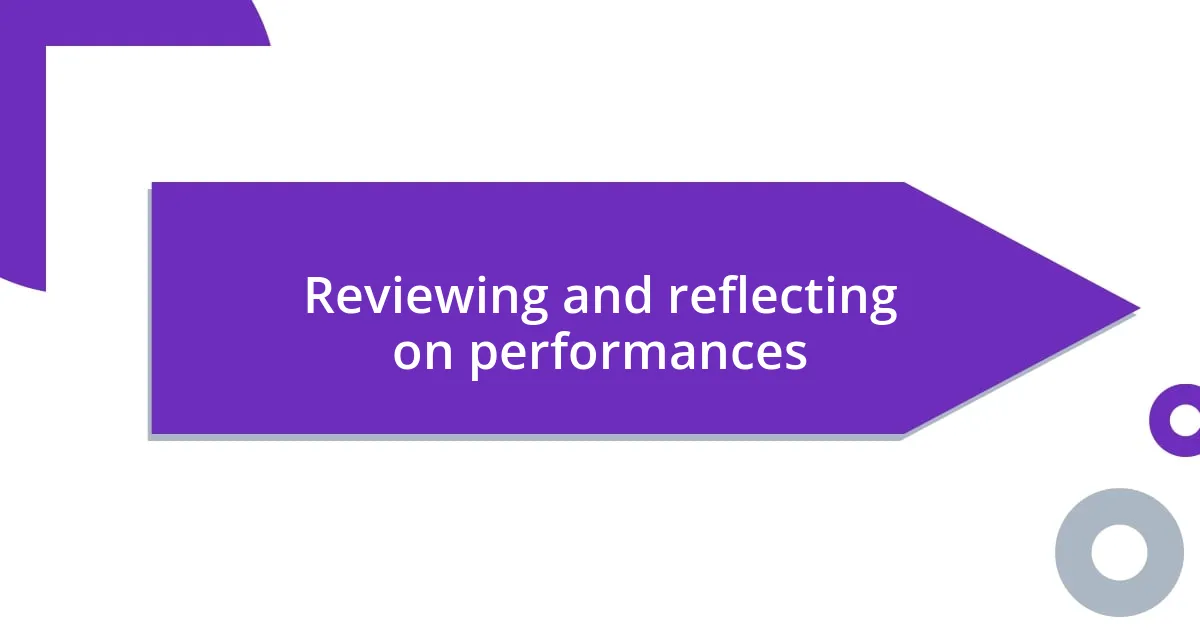
Reviewing and reflecting on performances
Reflecting on performances is a crucial step for my growth as an artist. After each show, I take a moment to jot down my thoughts in a journal, capturing what worked and what didn’t. There was one evening when I delivered a particularly emotional piece, and the connection with the audience felt electric. I noted that the authenticity of my feelings resonated strongly, and I want to replicate that experience in future performances. Have you ever considered how reflection can sharpen your skills?
I also find it helpful to watch recordings of my performances. Initially, it felt awkward to see myself on screen, but over time I developed a more analytical eye. I recall watching a rehearsal where I noticed minor habits that crept in, like a repetitive gesture that felt overdone. By recognizing these patterns, I could adjust and refine my stage presence. This process of self-discovery is truly enlightening; it’s like holding a mirror up to my artistry. Have you watched your performances to assess your growth?
Finally, discussing my shows with trusted peers is indispensable. I cherish these conversations—they offer outside perspectives that I might miss on my own. One particular discussion after a challenging performance revealed that others saw my struggle but were also inspired by my passion. It was a heartfelt reminder that vulnerability can create connection. In those moments of sharing, I find solace and motivation to keep pushing my craft forward. Isn’t it interesting how collaboration can enhance our understanding of our own experiences?







